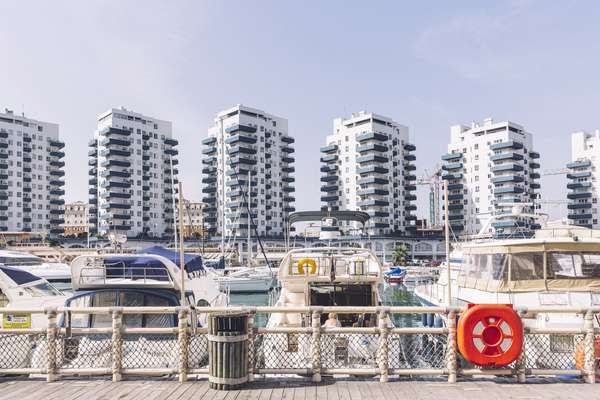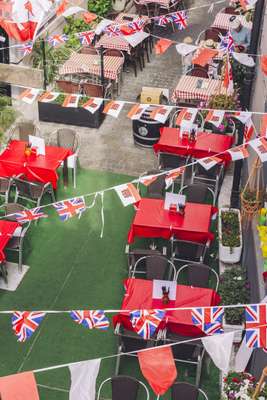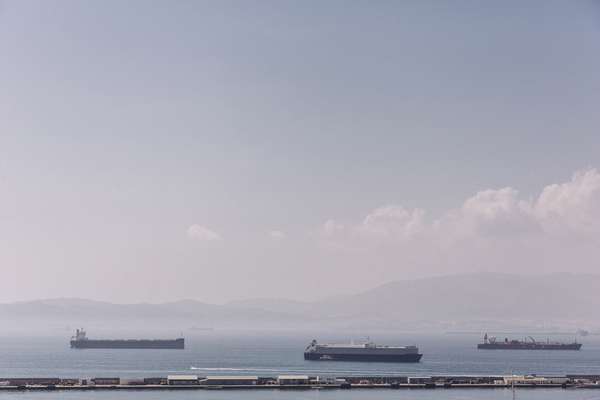Brexit / Gibraltar
Progressive rock
Gibraltar voted overwhelmingly to remain in the EU. With the rest of the UK set on leaving, what does that mean for the diminutive British territory?
So far this century, the people of Gibraltar have twice voted in referendums in which the key question was one of whether or not to pool power, and accept a measure of permeability and malleability where national borders were concerned. In 2002, on the question “Do you approve of the principle that Britain and Spain should share sovereignty over Gibraltar?” the vote was nearly 99 per cent “No” on a turnout of 88 per cent. In 2016, on the question “Should the UK remain a member of the European Union or leave the European Union?” it was 96 per cent “Remain” on a turnout of 84 per cent. In order to understand Gibraltar, it helps to understand that few Gibraltarians ever saw these results as contradictory.
“There has been a sense in the United Kingdom, for some time, that you cannot be patriotically British and pro-European and pro-EU at the same time,” says Gibraltar’s chief minister Fabian Picardo. “I think Gibraltar is a demonstration that those two concepts are not mutually exclusive – that you can consider yourself the proudest Briton and at the same time believe in the European project.”
The Rock of Gibraltar was captured by the British in 1704 during the war of the Spanish succession; it was formally ceded to the UK nine years later. Today the interior of Gibraltar’s government building on Convent Place leaves little room for doubt on the proud Briton score. In the reception area, unmissably large letters announce, “Her Majesty’s Government Of Gibraltar”. The only reading material made available to visitors waiting for their appointment is a glossy tome entitled Queen & Commonwealth: 90 Glorious Years.
Picardo, 46, has been head of Gibraltar’s government since 2011. His Socialist Labour party was last re-elected in November 2015, a few months before the launch of the Brexit referendum campaigns. Picardo confirms that the debate in the UK felt a bit alien to Gibraltar, especially the emphasis on immigration. “It’s just not an issue in Gibraltar,” he says. “We have 13,000 people commuting over the border into Gibraltar every day to work in our economy and we have about 40 people unemployed.”
The refusal of the rest of the UK to echo Gibraltar’s enthusiasm for the EU has, Picardo confirms, rather upended his plans for his government’s second term. “I originally thought that this would be a Brexit parliament – that after the result came in there would be little more I would be able to do in the lifetime of this parliament other than Brexit. I think I was right but I also think I underestimated the task. I think in Gibraltar and the UK there will be a lost Brexit generation – a generation of work to do simply to recreate the body of law that we need to regulate day-to-day activity. Even in the context of little Gibraltar, where the EU customs union, and fisheries and agriculture policies do not apply, we’re facing in the region of 12,000 different policy decisions to be made. I’ve got a cabinet of 10 ministers.”









When you ask Gibraltarians how much they’re looking forward to the UK’s formal withdrawal from the EU on 29 March, two themes recur. The first is that they, like their chief minister, need to work vexingly hard to ensure that as little as possible changes. The second, a corollary of the first, is that the place where they’re keenest to see continuity is at the north end of one of the world’s weirdest streets: Winston Churchill Avenue, which runs from downtown Gibraltar to the Spanish border, across the runway of Gibraltar’s airport (the road is closed during take-offs and landings).
“The focus is always the border,” says Brian Reyes, editor of the Gibraltar Chronicle. “And that’s related to other worries about passports, driving licences, the waters around Gibraltar.” The Chronicle is a 217-year-old title that serves a dual role befitting Gibraltar’s dual identity: it’s both a local newspaper to a small town of 34,000 people and a national journal of record to a fiercely proud nation of the same 34,000 people. In the Chronicle’s office on Grand Casemates Square – once a British fortress, now a huddle of pubs and fish-and-chip shops – Reyes says he enjoys the fact that one day’s front page might cover high affairs of state, the next a village fete. The Chronicle’s website has instituted a dedicated Brexit section and, says Reyes, “We serve Brexit up daily. People here live and breathe politics.”
Anywhere this is the case, it’s usually because people have had little choice –and Gibraltar is no exception to this rule. Plenty on the Rock are old enough to remember the years between 1969 and 1985 when Spain closed the border, effectively turning Gibraltar into an island (the border was fully reopened as a condition of Spain joining the EU). Since then the scale of any ructions between London and Madrid has often been measurable in queues at the frontier, as Spanish officials decide to search vehicles rather than wave them through. In 2013, after Gibraltar sank concrete blocks into the surrounding seas to deter Spanish fisherfolk from the Rock’s waters, Spain proposed (though did not implement) a €50 charge on border crossings.
“When the frontier was last closed, in 1969, the UK’s Ministry of Defence, the British garrison that used to be based here and the government made up 75 per cent of [Gibraltar’s] economy,” says Edward Macquisten, chief executive of Gibraltar’s chamber of commerce. Today, he adds, the economy is much larger and more diversified, and 75 per cent is made up by the private sector.
Here there is a general but cautious assumption that Gibraltar’s transformation into a regional economic powerhouse is the reason that Spain would never really follow through on any threat to isolate the Rock again. This school of thought hopes and/or believes that Madrid can read as well as anyone the statistics of Gibraltar’s robust growth versus those recording the dismal unemployment in La Línea de la Concepción, the town just over the frontier. Plus, that it can understand that there are reasons why thousands of Spaniards and other EU citizens living in Spain are commuting to Gibraltar rather than vice versa. Anxieties about Brexit notwithstanding, Gibraltar has the feel of a boomtown. The Rock’s famous troops of Barbary macaques are now pestered by 10 million-plus tourists annually. Gibraltar’s main street, which is called Main Street, is busy and its already crowded cityscape is hovered over by flocks of construction cranes.
“The morning after the Brexit vote coincided with our AGM,” says Jay Gomez, deputy chairman of the Gibraltar Funds & Investments Association. “It was like a day of national mourning. But we now think the impact will be less than we thought: most of our members aren’t Europe-facing but UK-facing.”
In the UK proper there has been mounting horror at the realisation of how much of its economy is entwined with Europe. In Gibraltar a measure of reassurance has been derived from how much its economy is tied to the UK – and hopefully, therefore, somewhat insulated from Brexit. People in government and business on Gibraltar are fond of quoting the statistic that 20 per cent of cars on British roads are insured by companies based in Gibraltar, and that upwards of 70 per cent of the UK’s online gaming bets are won and lost here. They are also keen to cite the pragmatic, enterprising spirit of what has, historically, been a nation of traders. One hope is for Gibraltar to position itself as a crypto-currency hub. This year, Gibraltar has introduced the world’s first regulations for initial coin offerings, the Gibraltar Stock Exchange has launched a blockchain subsidiary and local football team Gibraltar FC has announced that it will begin paying its players in crypto-currency.
But all eyes, and all discussions about Gibraltar’s future, turn to the border eventually. For the past few decades, give or take the odd display of petulance by Spain, common sense has prevailed. Gibraltarians and Spaniards alike understand that, as part of the UK, Gibraltar is outside the Schengen Area, and so it is necessary to take one’s passport to cross the border, though it’s unlikely to be closely scrutinised. The UK realises that Gibraltar is no back door to the mainland; passports at the airport, on the British side of the border, are checked before boarding what seems like it should be regarded as a domestic flight to the UK. There seems no reason why these arrangements should not continue.
But when the UK voted to leave the EU in 2016 it took Spain’s then foreign minister a matter of hours to suggest that the hoisting of the Spanish flag on the Rock was now “much closer”. A subsequent change of administration in Madrid lowered the temperature somewhat – as a general rule, cross-border relations improve under more left-wing, less nationalistic Spanish governments – but Gibraltarians remain wary, much the more so since the EU granted Spain an effective veto over Gibraltar’s inclusion in any EU-UK trade deal. However accustomed Gibraltarians have grown to the idea of being both British and European, there’s little doubt which they’d pick if asked, or forced, to choose.
“I think leaving the EU is a historic mistake,” says chief minister Picardo. “But it’s a mistake that Britain and Gibraltar are going to make together.”


